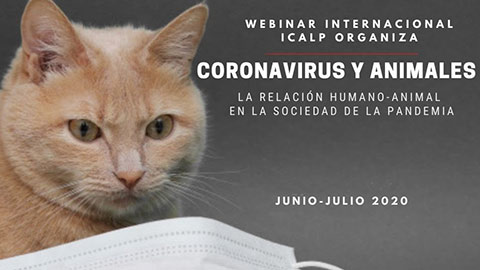Webinars to discuss human-animal relations in a pandemic society

"Coronavirus and Animals. The human-animal relationship in pandemic society" is an online webinar series ending on Thursday 16 July. During four weeks of June and July, 28 speakers from 15 countries and viewers from around the world have participated. A conference by Kyle Harper from Oklahoma University will end the series.
14/07/2020
A unique opportunity to bring together some of the most brilliant minds in the human-animal field under a multidisciplinary scenario of dialogue and debate.
The International Centre for Animal Law and Policy (ICALP) founded by the UAB five years ago has organised the series "Coronavirus and Animals. The human-animal relationship in pandemic society", a webinar series lasting four weeks and including a total of 28 speakers from 15 countries, as well as attendees from around the world.
The closing event will be on Thursday 16 July with a conference by Kyle Harper from the Oklahoma University. Harper is a writer whose works have been translated into more than 12 languages.
The series has aimed to find a space of debate and exchange of ideas to help set down a legal and scholarly agenda on Animal Law in the following years. The panels will cover a huge variety of topics regarding Animal Law and Animal Welfare issues, ranging from China to Australia. It has been be a unique opportunity to bring together some of the best minds of the field in a multidisciplinary scenario of dialogue and debate.
The inaugural event took place on 22 June, and included the presence of UAB lecturer and veterinary pathologist Martí Pumarola, as well as UAB Rector Margarita Arboix. Following the presentation, the inaugural conference was offered by Anne Peters, Director of the Max Planck Institute in Heidelberg. It also included the presence of the director of ICALP, Teresa Giménez-Candela.
In this webinar series, the ICALP has managed to bring together the best representatives of transversal specialities to discuss the many and varied issues that animals present to a wide assortment of cultures and countries around the world at a time in which improving the lives of animals is improving the lives of citizens.
The goal of this cycle has been to enrich the reflection upon how society can change the paradigms that have led us to this situation: industrial activities such as agriculture, farming and aquaculture; the conservation of wild fauna in all its entirety; cohabitation with urban animals; social responsibility towards climate change and the preservation of biodiversity; entertainment, fashion and social relations culture; animal experimentation; transparency and consumer awareness that demands a better understanding of how to ensure animal welfare; global sector governance requiring global agreements that go beyond the EU; public policies recognising animal sentience; the contribution of eco-centric ethical awareness. In all, these are just some of the topics that can contribute towards knowing more to help animals better.
Speakers included lawyers and magistrates, veterinarians, biologists, journalists, philosophers, historians, academics and experts in climate change and EU policies on animal welfare.
The series took place throughout June and July by way of 30 minute conferences available for all who signed up, and were recorded in the individuals choice of language (preferably English or Spanish).
The ICALP, created by the UAB in 2015, is the first interdisciplinary, interdepartamental and international centres that structurally integrates Social Sciences, the Humanities, Health Sciences and Animal Welfare Science. This produces an important synergy between four large scientific communities which have traditionally worked seperately, and which now approach all animal-realtes aspects in a comprehensive manner.